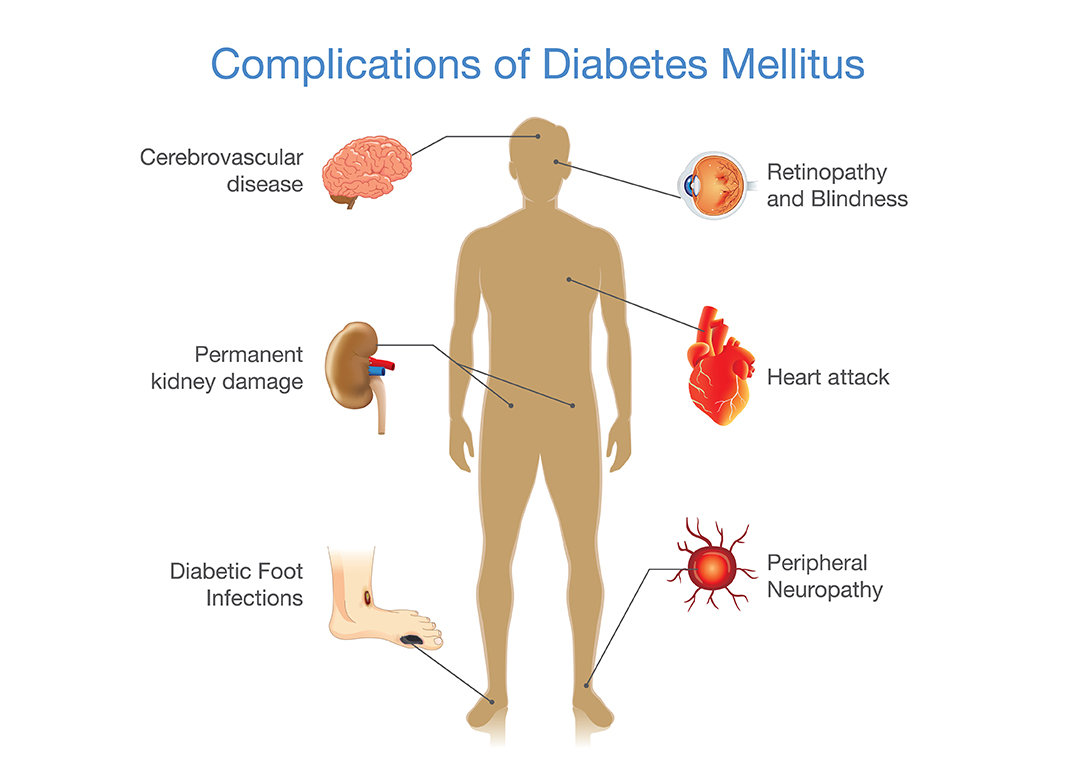Diabetes has become a prominent health challenge worldwide. In 2019, more than 11% of the United States population had diabetes, and this number continues to rise. There is an alarming lack of awareness surrounding this condition as 1 in 5 people with the condition don’t know that they have it.
Type 2 diabetes disproportionately impacts the Black community. African Americans are 60% more likely to be diagnosed with the condition and at least twice as likely to be hospitalized and experience long-term complications including death, when compared to non-Hispanic whites
Factors that may contribute to this health disparity include genetics, socioeconomic factors, and access to quality healthcare. Prevention and management are key factors to reduce the impact of type 2 diabetes among African Americans and improve outcomes.
You can navigate your type 2 diabetes diagnosis by understanding the risks and making informed choices. There are several adverse health consequences of type 2 diabetes but many of them may be preventable.
Uncontrolled Type 2 Diabetes
In general, type 2 diabetes control is evaluated by measuring routine blood sugar readings. Blood sugar goals may vary slightly based on patient-specific factors such as age and presence of other health problems. There are two ranges for blood sugar goals.
- Fasting (before meal): 80-130 mg/dL
- After a meal (2 hours): less than 180 mg/dL
The A1c test is a blood test that is used to measure the 3-month average of your blood sugars. It is used to provide additional insight into diabetes control. A1c is expressed as a percentage with a recommended A1c target of < 7% for most people with diabetes.
Consequences of Uncontrolled Type 2 Diabetes
If left uncontrolled, type 2 diabetes can result in long term consequences over time. These health risks involve various parts of the body and can greatly impact quality of life and overall health.
Long-term complications of uncontrolled type 2 diabetes include:
Heart problems
Heart disease is the most fatal complication associated with type 2 diabetes. People living with diabetes are two times more likely to have a stroke or heart disease than people who don’t have diabetes. Symptoms of heart disease include shortness of breath, tiredness, chest pain, and numbness in your arms or legs. You can maintain your heart health by managing your diabetes.
Kidney damage
Diabetes is the leading cause of kidney damage resulting in chronic kidney disease (CKD). Our kidneys serve as blood filters for our bodies. High blood sugar levels can be present in uncontrolled type 2 diabetes and cause the kidneys to have to work harder, diminishing their function and causing damage long term. CKD often develops slowly, and it may be difficult to identify symptoms of kidney disease until it’s too late. You can prevent kidney disease by keeping your blood sugar at goal.
Nerve damage
Nerve damage affects nearly 50% of people living with type 2 diabetes. The most common type is peripheral neuropathy which impacts nerves in the hands, feet, legs, and arms. Symptoms include tingling, pain, increased sensitivity, or numbness of the affected area. Controlling your blood sugar is the best way to prevent nerve damage. You should also have foot exams completed routinely and help identify issues proactively.
Vision issues
Diabetes can damage your eyes over time. It is the leading cause of new cases of blindness in adults 18-64 years of age. People of color are at higher risk of going blind due to diabetes complications. While there aren’t any signs or symptoms to monitor for, you can be proactive by completing an annual eye exam to monitor for eye disease and delay vision loss.
Mental health
Living with diabetes and managing your condition can come with an overload of different emotions. You may feel anxious, worried, discouraged, and frustrated. Address mental health concerns with your health care provider and consider speaking with a therapist or counselor if needed
Take Control
You can lower your risk of diabetes-related complications by making healthy lifestyle changes, monitoring your readings regularly and working to keep them at goal, taking your medications as prescribed, and following up with your doctor regularly. Medication therapy plays a major role in lowering your risk, especially for those at high risk or who have prediabetes.
Take control of your health and avoid the consequences of type 2 diabetes through informed choices, regular checkups, taking your medications, and committing to a healthy lifestyle.
Lilly is also working to help you take control of your health through clinical trial participation. Click here to learn more.
References
- American Diabetes Association. Statistics About Diabetes
- United States Department of Health and Human Services Office of Minority Health. Diabetes and African Americans
- Centers for Disease Control and Prevention. Manage Blood Sugar
- American Diabetes Association. Diabetes Complications
- Centers for Disease Control and Prevention. Diabetes and Mental Health






